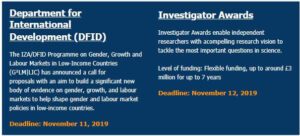


Knowledge-sharing and Commitment to Mutual Learning within the Nonprofit Space – Istanbul Principle VII
Nonprofits play an increasingly important role in both local and international development. With a dynamic environment fraught with uncertainties, no single nonprofit is a repository of all knowledge, hence the need for continuous learning.
To address developmental challenges, the activities of nonprofits are increasingly reliant on high-quality information and knowledge shared- necessary for organisational effectiveness and sustainability through collaborative practices.
Knowledge is the intellectual capital of any organisation and it must be said that while many nonprofits lack the critical processes and knowledge needed to help them develop, evaluate, document, and share successful programs, there is quite a number who have these capacities. Being in the space to create and share knowledge with one another while mutually committing to continuous and sustained learning is key to long term organisational effectiveness for individual organisations and the nonprofit sector at large. Part of the benefits for Civil society organisations (CSOs) involved in this kind of arrangement is the renewed capacity to execute key activities within a given time-frame.
Knowledge-sharing engenders growth within the sector especially when smaller nonprofits are privy to experiences of bigger organisations who faced down challenges in the past, learned from them and eventually delivered on their goals. Thus, various actors while working together would produce knowledge and share essential information that promotes grassroots development.
The 7th Istanbul principle of development effectiveness states – “CSOs are effective as development actors when they enhance the ways they learn from their experience, from other CSOs and development actors, integrating evidence from development practice and results, including the knowledge and wisdom of local and indigenous communities, strengthening innovation and their vision for the future they would like to see”.
CSOs need to commit to mutual learning and knowledge sharing because developmental issues can only be addressed by acting together, which is necessary for achieving collaboration and mutual learning for nonprofits. Many pressing concerns are universal, and can only be tackled by multi-sectoral collaboration and sharing mechanisms. Working together guarantees long-term prosperity for all, reduces duplicity of actions and plays a key role in informing coherent policy-making for better global impacts.
Despite the dynamics of power among nonprofits in Nigeria that hinder proper information sharing and constitute barriers to collective knowledge development, nonprofits should see themselves as partners, collaborate, share information and commit to mutual learning from all stakeholders for the good of their organisation and the society at large.
This newsletter is supported by Forus. However, the ideas and opinions presented in this document do not necessarily represent those of Forus, NNNGO or any other organisations mentioned.
